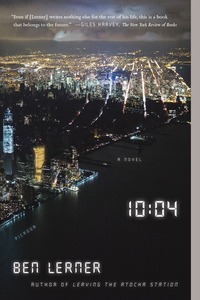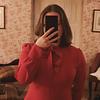You need to sign in or sign up before continuing.
Take a photo of a barcode or cover
As I read the first half of this book, I felt determined not to like it. I would call the genre Brooklyn metafiction, and everything about it and the author's hyper-articulate, neurotic narration annoyed me. But the particularities of Ben Lerner's life in New York and its proximity to my own is hard to resist. If you lived in New York during the year between Hurricane Irene and Superstorm Sandy, if you went to see Christian Marclay's The Clock, if you were a child when Christa McAuliffe was going to be the first Teacher in Space, this book will have a lot of charm. Basically, if you're a young to middle-aged liberal white person who likes art, this book is calling your name. Lerner attempts a Sebald-like unfolding of fictional and non-fictional stories (along with a few photographs) to pull the reader into consideration of the nature of our perception. He looks at the Manhattan skyline and notices the absence of the Twin Towers like a presence. He tells the story of a friend who finds out her father is not her real father, and then is left wondering if she can still call herself Lebanese. She watches her hand as it pales in her own perception now that she knows she's not really half-Lebanese even though she speaks the language, can cook the food, sing the songs. In all these stories, the fake, the fraudulent, even the true, but no-longer true cast their shadows over reality. How much can we control this dynamic through our thoughts, through art, through casting our minds back into the past? How can we integrate them into our present understanding? If you don't have patience for this, or if this sounds like a tedious exercise in privilege-inflected onanism, I completely understand. Ben Lerner walks a fine line, but for me this fell just on the right side of it.
challenging
emotional
funny
reflective
medium-paced
Plot or Character Driven:
A mix
Strong character development:
Complicated
Loveable characters:
Complicated
Diverse cast of characters:
Complicated
Flaws of characters a main focus:
Yes
I always think that if an author can get me to laugh out loud, then they're doing something right. This book had me stitches at one point, so it's doing well on that front.
I don't read much literary fiction in general. I would definitely say that I'm a genre fiction reader, and I know my tastes can be quite fixed. Still, I really enjoyed parts of this, and less so other parts. There's a lot of relatable moments the narrator describes, and those moments, tied into their relationships with the people around them, were the highlights of the book. The parts where it felt like it was just a writing writing about writing and other writers felt like a circlejerk moment, and I didn't really enjoy those parts at all.
Still, worth a read for the humour and very real human moments and experiences that most would find hard to put into words.
I don't read much literary fiction in general. I would definitely say that I'm a genre fiction reader, and I know my tastes can be quite fixed. Still, I really enjoyed parts of this, and less so other parts. There's a lot of relatable moments the narrator describes, and those moments, tied into their relationships with the people around them, were the highlights of the book. The parts where it felt like it was just a writing writing about writing and other writers felt like a circlejerk moment, and I didn't really enjoy those parts at all.
Still, worth a read for the humour and very real human moments and experiences that most would find hard to put into words.
“prosody and grammar as the stuff out of which we build a social world, a way of organising meaning and time that belongs to nobody in particular but courses through us all.”
“project myself / and then gaze back, an important trick because / the goal is to be on both sides of the poem / shuttling between the you and I.”
challenging
dark
emotional
funny
hopeful
informative
inspiring
mysterious
reflective
medium-paced
Plot or Character Driven:
A mix
Strong character development:
Complicated
Loveable characters:
Yes
Diverse cast of characters:
Yes
Flaws of characters a main focus:
No
challenging
funny
reflective
medium-paced
Plot or Character Driven:
Character
Strong character development:
Yes
Loveable characters:
Complicated
Diverse cast of characters:
No
Flaws of characters a main focus:
Yes
This book surprised me in many ways. Based on reviews I'd read, I thought I would love the book. When I started it, I thought it might not be for me. The voice and style seemed too precious-pretentious, distancing itself from genuine emotion through academic discourse, and basically being too young for me. But then it started to win me over.
The main character's over-educated and hyper-literate, neurotic digressions reminded me a little of Woody Allen. It reads as a modern literary comedy, I think, and there's surprising heart and craft to it.
I loved how the experience of reading the novel feels like we're watching it being written before our eyes, like we're part of the author's thought process. I also loved the echoing motifs ("the same, just a little different") and words ("dissected") that acted like call-backs, tying the strands of the novel together in strange and surreal ways.
There's a lot to love and admire about this novel, and I could have highlighted a ton more. Here are four parts that jumped out at me as I was reading:
—
It was a thrill that only built space produced in me, never the natural world, and only when there was an incommensurability of scale—the human dimension of the windows tiny from such distance combining but not dissolving into the larger architecture of the skyline that was the expression, the material signature, of a collective person who didn’t yet exist, a still-uninhabited second person plural to whom all the arts, even in their most intimate registers, were nevertheless addressed. Only an urban experience of the sublime was available to me because only then was the greatness beyond calculation the intuition of community.
—
The poem, like most of my poems, and like the story I’d promised to expand, conflated fact and fiction, and it occurred to me—not for the first time, but with a new force—that part of what I loved about poetry was how the distinction between fiction and nonfiction didn’t obtain, how the correspondence between text and world was less important than the intensities of the poem itself, what possibilities of feeling were opened up in the present tense of reading.
—
Say that it was standing there that I decided to replace the book I’d proposed with the book you’re reading now, a work that, like a poem, is neither fiction nor nonfiction, but a flickering between them; I resolved to dilate my story not into a novel about literary fraudulence, about fabricating the past, but into an actual present alive with multiple futures.
—
One should not—no rather cannot as a practical matter—expect one poet often to genuinely like the work of another—not a contemporary’s. Even when we think we are writing to one another we are not writing for one another and so incomprehension is probably a necessity. We poets are not, as Oppen would say, coeval with each other, let alone our readers. It’s in this sense the “public” is right to think of poets as anachronisms.
The main character's over-educated and hyper-literate, neurotic digressions reminded me a little of Woody Allen. It reads as a modern literary comedy, I think, and there's surprising heart and craft to it.
I loved how the experience of reading the novel feels like we're watching it being written before our eyes, like we're part of the author's thought process. I also loved the echoing motifs ("the same, just a little different") and words ("dissected") that acted like call-backs, tying the strands of the novel together in strange and surreal ways.
There's a lot to love and admire about this novel, and I could have highlighted a ton more. Here are four parts that jumped out at me as I was reading:
—
It was a thrill that only built space produced in me, never the natural world, and only when there was an incommensurability of scale—the human dimension of the windows tiny from such distance combining but not dissolving into the larger architecture of the skyline that was the expression, the material signature, of a collective person who didn’t yet exist, a still-uninhabited second person plural to whom all the arts, even in their most intimate registers, were nevertheless addressed. Only an urban experience of the sublime was available to me because only then was the greatness beyond calculation the intuition of community.
—
The poem, like most of my poems, and like the story I’d promised to expand, conflated fact and fiction, and it occurred to me—not for the first time, but with a new force—that part of what I loved about poetry was how the distinction between fiction and nonfiction didn’t obtain, how the correspondence between text and world was less important than the intensities of the poem itself, what possibilities of feeling were opened up in the present tense of reading.
—
Say that it was standing there that I decided to replace the book I’d proposed with the book you’re reading now, a work that, like a poem, is neither fiction nor nonfiction, but a flickering between them; I resolved to dilate my story not into a novel about literary fraudulence, about fabricating the past, but into an actual present alive with multiple futures.
—
One should not—no rather cannot as a practical matter—expect one poet often to genuinely like the work of another—not a contemporary’s. Even when we think we are writing to one another we are not writing for one another and so incomprehension is probably a necessity. We poets are not, as Oppen would say, coeval with each other, let alone our readers. It’s in this sense the “public” is right to think of poets as anachronisms.
emotional
reflective
slow-paced
Plot or Character Driven:
Character
Strong character development:
No
Loveable characters:
No
Diverse cast of characters:
No
Flaws of characters a main focus:
Yes
A very "meta" novel in which nothing much happens and the author manages to tell you a story about telling you a story. That's not a bad thing, mind you, but I found there to be relatively little payoff and far less dystopia than the blurb promises.
some words come up quite a lot in this book— dissect, proprioception, prosody, avuncular. it’s a book that benefits from binge-reading while getting steadily red-wine-tipsy, and which doesn’t benefit from reading on the subway. in opposite order I did both. it’s a pleasure and a challenge to read a book that feels so much smarter than you, even if, as ivy avers, it’s partly faking it. there were many long and beautiful passages that moved me near to tears just because they were beautiful and felt true. sometimes you dissolve into the night and see yourself out of time, remembering your own dissolution in the 3rd person, and you vow to write a book about the experience. pretty much only this guy actually did.




